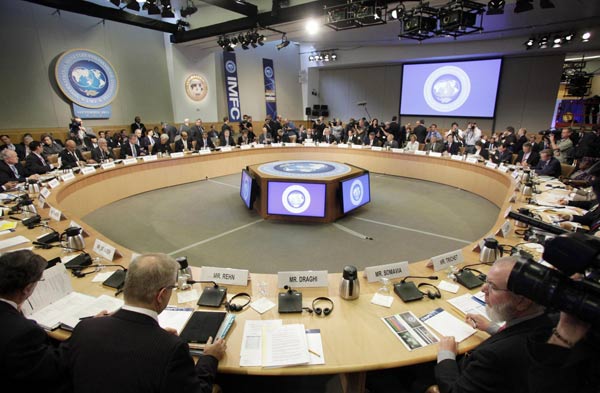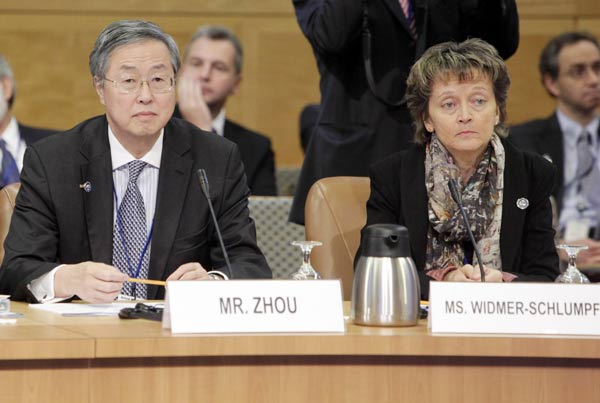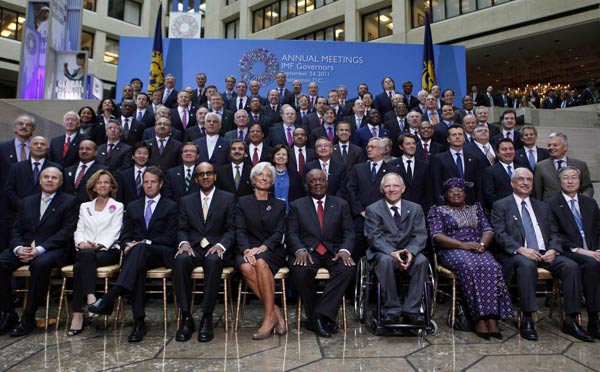Europe
Europe aims to beef up crisis fund, world urges action
Updated: 2011-09-25 10:44
(Agencies)
WASHINGTON - Europe is working to ramp up the firepower of its bailout fund, top officials said on Saturday, as the United States, China and other nations raised the alarm about its debt crisis hurting the world economy.
Financial markets plunged last week on fears that Greece's near-bankruptcy could spread to other euro zone countries, heaping pressure on European policymakers to prevent a repeat of the chaos that swept the world in 2007-2009.
 |
|
A view is seen of the International Monetary and Financial Committee (IMFC) meeting during the annual IMF-World Bank meetings in Washington September 24, 2011. [Photo/Agencies] |
The European Union's top economic official, Olli Rehn, said as soon as the region's governments confirm new powers for their 440-billion-euro fund, known as the EFSF, attention will turn to how to get more impact from the existing money.
"We need to find a mechanism where we can turn one euro in the EFSF into five, but there is no decision on how we could do that yet," another senior European official said on condition of anonymity.
The rescue fund would need to be at least 2 trillion euros to safeguard Italy and Spain if the crisis were to spread, financial analysts estimate.
The United States and other nations have urged Europe to leverage up the fund, possibly with support from the European Central Bank.
But officials from the ECB and from Germany, the region's paymaster, remained wary of using the central bank, which has a strict mandate to pursue low inflation.
"We should not think of leveraging a public pot of funds as a free lunch," said ECB Governing Council member Patrick Honohan.
Nonetheless, arming the euro zone with a bigger warchest to lend to governments or shore up banks was the focus of top finance officials from around the globe who met in Washington for semiannual meetings of the International Monetary Fund.
The sovereign debt crisis threatens to throw the euro zone into recession and has placed a troubling drag on an already slow US economy. It could come to weigh on emerging economies too.
"Brazil's experience with past crises suggests you have to confront the problems in a fast, consistent manner," said Brazilian central bank chief Alexandre Tombini.
"The longer it takes, the higher the cost, the more contagion spreads. You have to act with overwhelming force."
The IMF's steering committee said in a statement that the euro zone was committed to whatever was needed to resolve the single currency bloc's crisis.
It warned that the global economy had "entered a dangerous phase, calling for exceptional vigilance, coordination and readiness to take bold action" to cope with Europe's financial stress and prevent it infecting others.
European officials were scrambling to put in place a comprehensive crisis-fighting plan by the time leaders from the Group of 20 nations meet in France in early November.
Greece is at the epicenter of the crisis but it has threatened to spread to several other euro zone countries. Italy, the third-biggest economy in the currency bloc, has also struggled to retain investor confidence, but Italian Economy Minister Giulio Tremonti said on Saturday its financial house was "in order."
US Treasury chief Timothy Geithner, in his most explicit warnings to date, said the ECB should take a more central role in fighting the crisis. "The threat of cascading default, bank runs, and catastrophic risk must be taken off the table," he said.
E-paper

Pearl paradise
Dreams of a 'crazy' man turned out to be a real pearler for city
Literary beacon
Venice of china
Up to the mark
Specials

Power of profit
Western companies can learn from management practices of firms in emerging economies

Test of character
Keyboard-dependent Chinese are returning to school because they have forgotten how to write

Foreign-friendly skies
About a year ago, 48-year-old Roy Weinberg gave up his job with US Airways, moved to Shanghai and became a captain for China's Spring Airlines.


